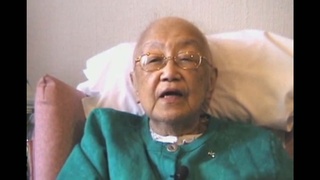Interviews
Devastation in Tokyo after World War II
The devastation, well, we both saw it -- we saw it both in Manila and in Japan, especially Tokyo, Yokohama, and Osaka, too. These are major cities that were devastated. And you see blocks and blocks of nothing but torn buildings, bricks, devastation very clearly. And I was amazed, we should have known better, but here, what was I, a twenty-year-old or whatever. We should have been more thoughtful, I guess. But I remember the first night we got into town, into Tokyo, my friend and I were, by the time the airplane found the airfield and we got into town, we were, one of the few buildings standing was the Morinaga Building, right next to Hibiya Park, Hibiya Koen, in the middle of Tokyo. So we go out in the streets, and we're hungry, so we see this policeman, and we says, Hey, is there any restaurant open around here? He just laughed at us. He said, "You bombed the heck out of us. We don't have food, let alone restaurants that are open." We should have known better. And it was really a sad situation for the Japanese.
Date: March 19, 2004
Location: California, US
Interviewer: Mitchell Maki
Contributed by: Watase Media Arts Center, Japanese American National Museum.










